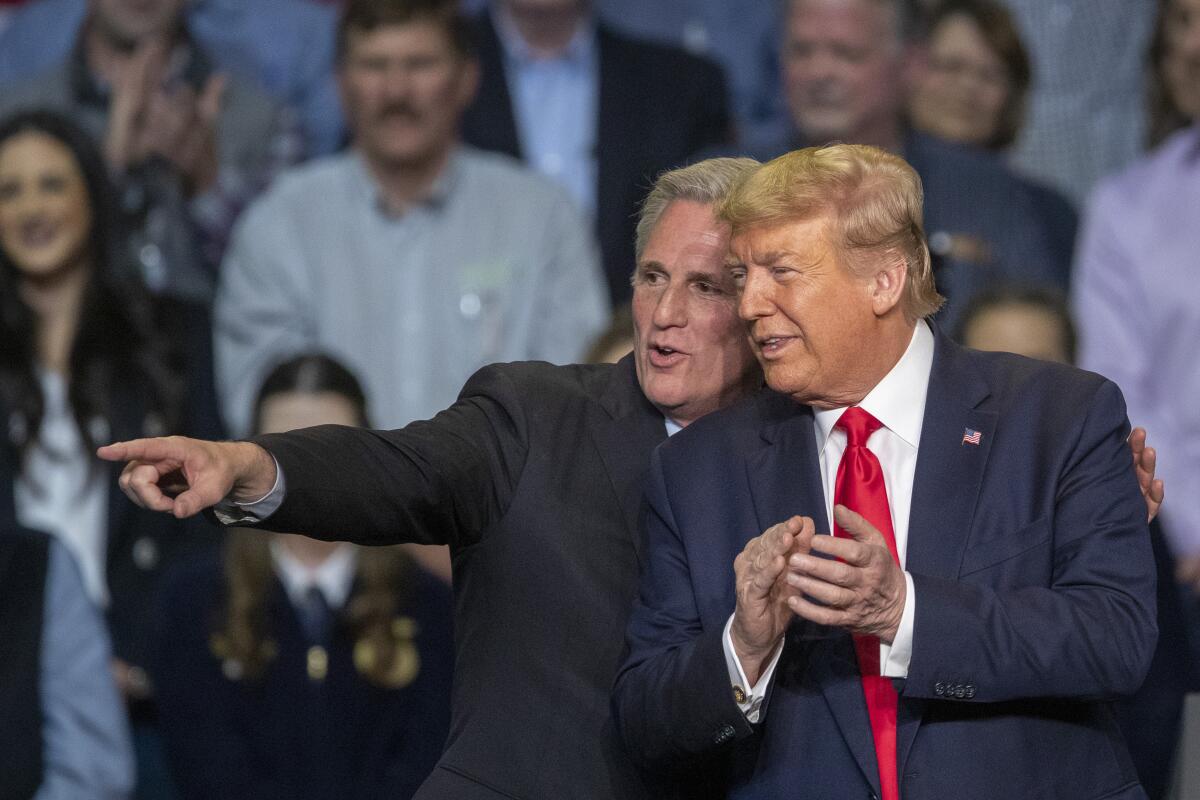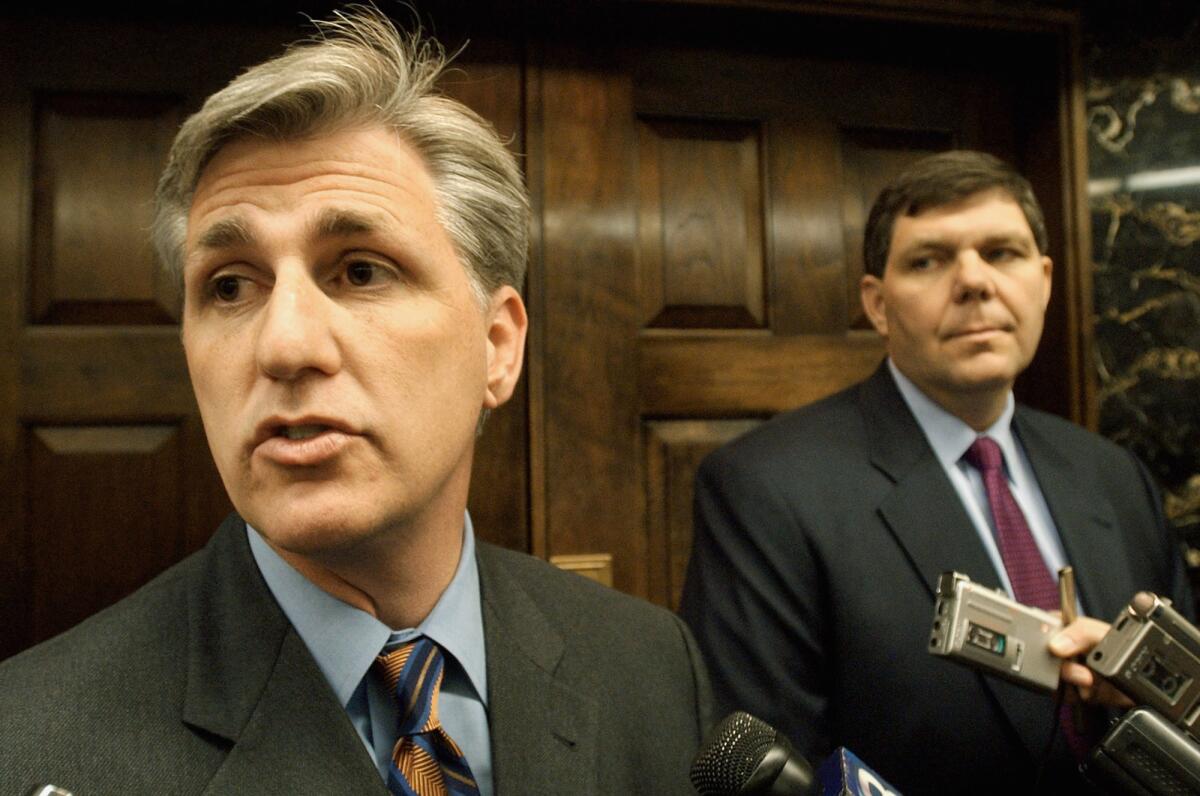News Analysis: McCarthy’s once formidable powers of persuasion couldn’t stop a humiliating, historic defeat

- Share via
Kevin McCarthy’s long career has been about calculating the odds and working the backrooms, but those traits, which barely won him the House speakership earlier this year, were not enough to stop several far-right Republicans from pushing him out of the job he had craved since he was a young California assemblyman from Bakersfield.
The vote Tuesday to oust McCarthy was a humiliating and historic defeat that revealed the limits of his formidable powers of persuasion while further exposing an increasingly divided and rancorous Republican Party whose extremists have broken the bounds of convention for a radical agenda against President Biden that has no use for what they describe as McCarthy’s conciliatory — and weak — nature.
McCarthy is a politician of affability and a master of fundraising. He is also a man of pliable principles and a tactician who can delineate the percentages and voting patterns of the most obscure legislative districts. He has never been about visions or grand ambitions to reshape America’s cultural and political order. That failing, at least in the eyes of those who led the revolt against him, including Rep. Matt Gaetz (R-Fla.), is too detrimental in an era when politics is less about compromise than it is about intransigence and bloodsport.
McCarthy’s downfall played out as a crowd swelled into the visitors gallery and the House floor filled with scurry, whisper and chaos. It was yet another national drama, a breathtaking moment of turmoil that defined our troubled times and left McCarthy, dressed in a dark suit, his graying hair bristly on the sides, the fallen leader of a party he has traveled countless miles for as he helped raise hundreds of millions of dollars to support Republican candidates across the land.
“He set himself up in a very precarious position,” said Mike Madrid, a Republican consultant who has known McCarthy for years. The congressman, he said, had long relied on his skills of working with factions and placating the party’s radical flank. “That was always his strength. That’s why it’s a Greek tragedy. His strengths ended up undoing him. When you fly too close to the sun, your wings melt. He’s not an empathetic figure. He saw this coming.”

The congressman is damaged, but he may remain a force in a House that is in disarray as a presidential election looms a year away. “Republicans are in the majority today because Kevin McCarthy raised a historical amount of money to put them there,” said Jim Brulte, a former state senator and past chairman of the California Republican Party. “No one knows what lies ahead in coming days, but Kevin is still the north star most Republicans in the House look to.”
The venom against McCarthy from eight GOP rebels was stinging. Gaetz blamed him for not demanding deeper spending cuts from the Biden administration and for doling out “multiple contradictory promises” in a “failure theater” that did little to derail the plans of Democrats. Others, including Rep. Bruce Westerman (R-Ark.), who spoke for the majority of the party, credited McCarthy and warned the rebels that their move was “selfish, bad for conservative policy and bad for America.”
McCarthy did not rise to defend himself. He became the first speaker in history to be brought down by a chamber vote.
“Now what?” yelled one member from the House floor.
The plot to overthrow him was hardly a surprise; it was like a train wreck that had been moving ever closer since January when he gave into hard-right demands — including making it easier to challenge his leadership — to win his post after 15 rounds of contentious voting. That gamble hung over his speakership and narrowed his chances of survival, especially after last week’s House vote, supported by Democrats, to pass a funding bill to avoid a government shutdown. The compromise won McCarthy praise in some quarters as being statesmanlike, but it outraged his party’s rebels.
“Kevin McCarthy is a perfect example of what happens when you choose power over principles. Eventually, you end up with neither,” read a post on X, formerly Twitter, by the Lincoln Project, an anti-Trump, pro-democracy organization.
McCarthy’s fate is a tale of irony and a lesson on how the country’s increasing polarization has accelerated the pressure on conventional politicians. Shortly after McCarthy was elected to Congress in 2006, he marked himself for ascent, becoming one of the GOP’s “Young Guns” along with then-Reps. Eric Cantor of Virginia and Paul D. Ryan of Wisconsin. They were going to break convention and revive the Republican Party to counter the presidency of Barack Obama. Their agenda now reads tame when weighed against the ambitions — many call them reckless — of Gaetz and other hard-liners to upend the government on everything from budgets to immigration to investigating the Biden family.

The congressman from Bakersfield, a middling football player who married his high school sweetheart, drew closer to the currents that would undo him when he initially denounced Donald Trump but then stood by the former president in the weeks after the Jan. 6, 2021, riot at the U.S. Capitol. It was an act of political expediency, but it angered Democrats and moderate Republicans who saw it as a chance to disgrace the former president and keep him out of politics. McCarthy was criticized as being duplicitous and self-serving, but he believed he needed the loyalty of Trump and his followers to get him into the speaker’s chair.
He discovered how precarious that was soon after Republicans assumed the majority in January. McCarthy had the support of the vast majority of his party, but its hard-right members, including Gaetz, who became McCarthy’s most potent nemesis, viewed him more as a shape-shifter than a man of conviction who would propel a radical agenda. They held up McCarthy’s rise to speaker through more than a dozen votes — McCarthy and Gaetz had tense moments on the House floor — until Gaetz relented.
“My question in all this is, ‘Where was Trump today?’” Madrid asked. “Kevin genuflected at his altar” in 2021, but the former president did not attempt to rescue McCarthy.
McCarthy’s strength throughout his career was bringing the disparate factions of his party together. He sought out potential Republican candidates and courted votes and money from farmers, tech impresarios and billionaires. He spent his early time in Congress sleeping on his office couch and listening to the anxieties of new members. In an interview last year as McCarthy was seeking reelection, Jack Pandol Jr., a Republican strategist, said the congressman was a cross between “Gen. Patton and the Energizer Bunny. He can crack the whip. He is a survivor. His enemies have taken a shot at him more than once and he still gets up.”
The son of a firefighter and grandson of a cattle rancher, McCarthy, who grew up in the harsh seasons of the San Joaquin Valley, found the power he won as speaker tricky to navigate. He was pressured by the hard right to slash government spending, open an impeachment inquiry into Biden, purge the Justice Department, press for indictments against the president’s son Hunter Biden, and cut funding to Ukraine for its war against Russia. Keeping the radical faction in line became an embarrassing preoccupation that daily tested his chameleon-like gifts and led him into a bitter struggle with Gaetz.
It was very real even as it read like a script from the Netflix series “House of Cards.” McCarthy had years ago allowed Kevin Spacey to follow him around as the actor prepared for his role as conniving congressman Francis Underwood. But, like Underwood, McCarthy in recent months was finding it hard to appease the radicals; his conciliatory powers were failing him, and it was increasingly clear he couldn’t give all sides what they wanted.

That dilemma played into the wider acrimony that has gripped the nation’s culture and politics in recent years. Many Americans have lost faith in institutions as politics have become more an angry performative art than a consensus between parties.
“We are now using removal from office as a political weapon,” said Brulte. “Beginning with Clinton, over the last five presidents we’ve had three impeachments and three Senate trials. I think that’s what happened today in voting out McCarthy.”
“Our institutions are changing,” said Madrid. “We’re no longer governing by norms or rules if a mob is bent on destroying them. It’s a battle of personalities. McCarthy may be the last establishment Republican.”
Shortly after the vote to bring him down, McCarthy told his party he would not seek reelection as speaker.
“I don’t regret standing up for choosing governance over grievance,” he told reporters. “It is my responsibility. It is my job. I do not regret negotiating. Our government is designed to find compromise.”
More to Read
Get the L.A. Times Politics newsletter
Deeply reported insights into legislation, politics and policy from Sacramento, Washington and beyond. In your inbox twice per week.
You may occasionally receive promotional content from the Los Angeles Times.











